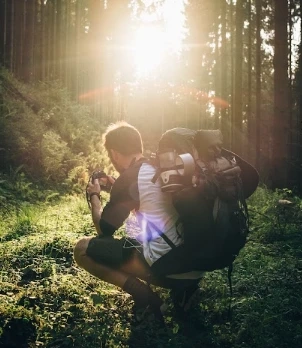Embarking on a solo backpacking adventure can be an incredibly rewarding experience, allowing you to connect with nature on a deeper level and challenge yourself in new ways. However, venturing into the wilderness alone also comes with its own set of risks and challenges.
To ensure a safe and enjoyable solo backpacking trip, it's essential to be prepared and equipped with the right knowledge and gear. Here are some top hacks for staying safe on your next solo backpacking hike.
1. Plan the Route Carefully
Before setting out on your solo backpacking adventure, make sure to carefully plan what route you’ll be taking. Research the area properly,and consider things like distance, elevation gain, and available water sources. It's also a good idea to inform someone you trust of your hiking plans and expected return date.
2. Pack Light but Wisely
When hiking solo, every ounce of weight matters. Opt for ultralight hiking packs and ultralight backpacking gear to minimize the strain on your body. Pack only the essentials, focusing on items that will help ensure your comfort and safety on the trail.
Don't forget to include emergency supplies such as a first aid kit, navigation tools, and extra food and water.
3. Stay Hydrated and Nourished
Pack lightweight, high-energy snacks that will provide you with sustained fuel throughout the day. It's also essential to listen to your body and rest and refuel as needed.
4. Be Weather Aware
Pack appropriate clothing layers, including waterproof and windproof outer layers, even if the forecast calls for clear skies. Be ready to modify your plans or find shelter if the weather changes unexpectedly.
5. Practice Leave No Trace Principles
Respect your environment and try to minimize the impact of your presence there by practicing Leave No Trace principles. Pack out all of your trash, dispose of waste properly, and avoid damaging vegetation or disturbing wildlife.
Leave campsites and trails as you found them, ensuring that future hikers can enjoy the same pristine wilderness experience.
6. Listen to Your Gut
As a solo backpacker, it's essential to hear what your instincts say. If you feel there is danger, change your course or look for help immediately.
Be attentive of any signs of potential hazards, such as changing weather conditions, unfamiliar noises, or animal activity.
7. Carry a Personal Locator Beacon
During emergencies, a personal locator beacon (PLB) can be a vital tool. These small, lightweight devices enable you to transmit a distress signal to emergency services, providing precise coordinates of your location.
While you hope to never use it, carrying a PLB can provide peace of mind.
8. Practice Basic Wilderness Survival Skills
Make sure you know how to build a fire, find shelter, and signal for help in case of an emergency. Familiarize yourself with local flora and fauna, including potential hazards such as poisonous plants or predatory animals.
Being prepared for the unexpected can help you stay calm and make informed decisions in challenging situations.
9. Stay Connected
While solo backpacking is often a solitary experience, it's essential to stay connected with the outside world, especially in case of an emergency.
10. Enjoy the Journey Safely
Above all, remember to enjoy the journey safely. Solo backpacking can be a transformative experience, allowing you to test your limits and discover your inner strength.
By following these safety hacks and tips, you can embark on your solo backpacking adventure with confidence, knowing that you're well-prepared to handle whatever challenges come your way.
Ready to gear up for your next solo backpacking adventure? Visit Light Hiking Gear to shop for high-quality lightweight backpacking gear and other essential backpacking gear.



